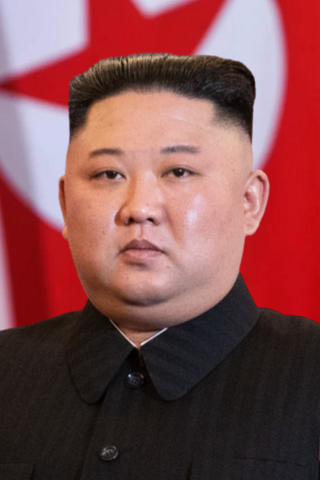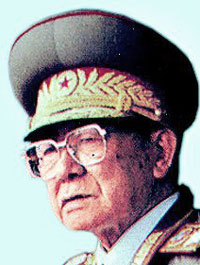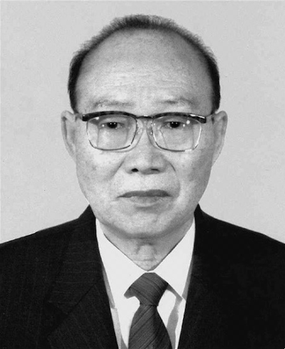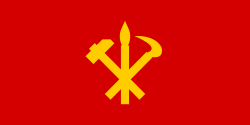
The General Secretary of the Workers' Party of Korea is the leader of the Workers' Party of Korea (WPK), the ruling party in North Korea, and the country's supreme leader. Party rules stipulate that the party congress elects the general secretary. The party conference and the Central Committee are empowered to remove and elect the party leader. The general secretary is "ex officio" Chairman of the WPK Central Military Commission and leads the work of the secretariat. Additionally, the general secretary is by right of office member of the WPK Presidium, the WPK Politburo and the WPK Secretariat.

Marshal Choe Kwang was a prominent military leader in North Korea.

Parliamentary elections were held in North Korea on 25 August 1948 to elect the members of the 1st Supreme People's Assembly. Organised by the People's Committee of North Korea, the elections saw 572 deputies elected, of which 212 were from North Korea and 360 from South Korea.

Parliamentary elections were held in North Korea on 27 August 1957 to elect members of the 2nd Supreme People's Assembly. Voters were presented with a single list from the Democratic Front for the Reunification of the Fatherland, dominated by the Workers' Party of Korea.

The Central Military Commission of the Workers' Party of Korea (CMC) is an organ of the Central Committee of the Workers' Party of Korea (WPK) which heads the Korean People's Army (KPA).

In North Korea, the Political Bureau of the Central Committee of the Workers' Party of Korea (WPK), or simply the Politburo, formerly the Political Committee (1946–61), is the highest decision-making body in the ruling party between sessions of its Central Committee. Article 25 of the Party Charter stipulates that "The Political Bureau of the Party Central Committee and its Standing Committee organize and direct all party work on behalf of the party Central Committee between plenary meetings. The Political Bureau of the Party Central Committee shall meet at least once every month." The Politburo is elected by the Central Committee of the Workers' Party of Korea.

The Secretariat of the Workers' Party of Korea, formerly known as the Executive Policy Bureau (2016–21), manages the work of the Politburo of the Workers' Party of Korea and its Presidium. The General Secretary leads the work of the Secretariat, and the body is composed of several members.

Kim Kuk-thae was an elder apparatchik of the Workers' Party of Korea, the ruling party in North Korea.

The 1st Congress of the Workers' Party of North Korea (WPNK) was held in Pyongyang, North Korea, from 28 to 30 August 1946, and established the Workers' Party of North Korea. The congress is the highest organ of the party, and is stipulated to be held every four years. A total of 801 delegates represented the party's 336,399 members. The 1st Central Committee, elected by the congress, elected Kim Tu-bong as WPNK Chairman, Kim Il Sung and Chu Yong-ha as deputy chairmen.

The 2nd Congress of the Workers' Party of North Korea(Korean: 북조선로동당 제 2차 대회) (WPNK) was held in Pyongyang, North Korea, from 27–30 March 1948. The congress is the highest organ of the party, and is stipulated to be held every four years. 999 delegates represented the party's 750,000 members. The 2nd Central Committee, elected by the congress, reelected Kim Tu-bong as WPNK Chairman, and Kim Il Sung and Chu Yong-ha as deputy chairmen.

The 3rd Congress of the Workers' Party of Korea (WPK) was held in Pyongyang, North Korea, from 23–29 April 1956. The congress is the highest organ of the party, and is stipulated to be held every four years. 916 delegates represented the party's 1,164,945 members. The 3rd Central Committee, elected by the congress, reelected Kim Il Sung as WPK Chairman, and a number of deputy chairmen.

The 5th Congress of the Workers' Party of Korea took place from 2–13 November 1970.

The 2nd Central Committee of the Workers' Party of Korea (WPK) was elected at the 2nd Congress on 30 March 1948, and remained in session until the election of the 3rd Central Committee on 29 April 1956. In between party congresses and specially convened conferences the Central Committee is the highest decision-making institution in the WPK and North Korea. The 2nd Central Committee was not a permanent institution and delegated day-to-day work to elected bodies, such as the Political Committee, the Standing Committee, the Organisation Committee and the Inspection Committee in this case. It convened meetings, known as "Plenary Session of the [term] Central Committee", to discuss major policies. Only full members had the right to vote, but if a full member could not attend a plenary session, the person's spot was taken over by an alternate. Plenary session could also be attended by non-members, such meetings are known as "Enlarged Plenary Session", to participate in the committee's discussions. During its tenure it held five plenary sessions, one enlarged session, seven joint plenary sessions and four stand-alone plenums.

Hwang Sun-hui was a North Korean politician who served in several high-ranking positions in the Workers' Party of Korea (WPK), including in the Supreme People's Assembly and the Central Committee of the WPK. She was affiliated with the Korean Revolution Museum from 1965, and was its director from 1990.
The 3rd Conference of the Workers' Party of Korea was held in Pyongyang on September 28, 2010. The meeting elected the highest authority of the Workers' Party of Korea, and revised the party charter. North Korean leader Kim Jong Il also attended the meeting. A plenary meeting of the Central Auditing Committee of the Workers' Party of Korea and the September 2010 plenary meeting of the Central Committee of the Workers' Party of Korea were held earlier on the same day.

The 8th Congress of the Workers' Party of Korea was held at the April 25 House of Culture in Pyongyang from 5 to 12 January 2021. A total of 7,000 people participated in the congress including 5,000 delegates. The Party Congress took place in the midst of the COVID-19 pandemic where no cases were reported.
The 7th Central Auditing Commission of the Workers' Party of Korea (WPK)(7차 조선로동당 중앙 감사위원회) was elected at the party's 7th Congress on 9 May 2016. In its 1st Plenary Session it elected Choe Sung-ho as Chair and Pak Myong-sun as Vice Chair.
The 1st Standing Committee of the Workers' Party of North Korea (WPNK)(1차 북조선로동당 상무위원회) was elected at the 1st WPNK Congress held in August 1946. It consisted of 13 members and remained active until the election of the 2nd Standing Committee by the 1st Plenary Session of the 2nd Central Committee on 30 March 1948. In between sessions of the Standing Committee, the Political Committee met in its place.
The 6th Secretariat of the Workers' Party of Korea (WPK)(6차 조선로동당 비서국), officially the Secretariat of the 6th Central Committee of the Workers' Party of Korea, was elected by the 1st Plenary Session of the 6th Central Committee in the immediate aftermath of the 6th WPK Congress.
The 2nd Political Committee of the Workers' Party of Korea (WPK), officially the Political Committee of the 2nd Central Committee (2nd CC), was elected in the immediate aftermath of the 2nd WPK Congress on 30 March 1948 by the 2nd CC's 1st Plenary Session. The composition changed on the merger of the Workers' Party of North Korea and the Workers' Party of South Korea (WPSK) on 24 June 1953, and was again changed after a purge of WPSK-affiliated communists on 6 August 1953.










